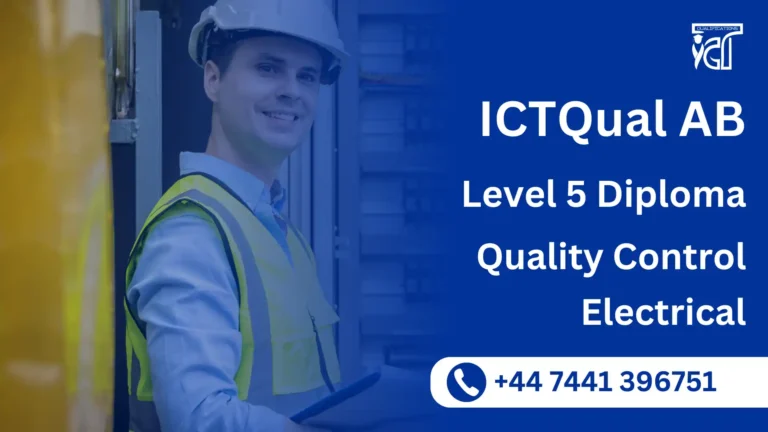In today’s fast-paced world, safety in the workplace and public spaces is paramount. One of the most essential areas of safety training is fire safety, a critical skill that can prevent catastrophic incidents. Among the top qualifications designed to address this need is the ICTQual Level 2 Award in Fire Safety. This qualification is perfect for individuals who are responsible for ensuring safety in various environments, from offices to industrial settings.
The ICTQual Level 2 Award in Fire Safety is a nationally recognized qualification designed for individuals who want to gain fundamental knowledge and practical skills in fire safety. This qualification is typically targeted towards those working in roles where fire safety and prevention are essential, such as safety officers, facility managers, or those responsible for the well-being of others in the workplace.
The course covers a wide range of topics related to fire safety, including fire prevention, risk assessment, emergency response, and the use of fire extinguishers. This award is ideal for individuals who wish to meet regulatory requirements and ensure a safer working environment.
The ICTQual Level 2 Award in Fire Safety provides learners with an in-depth understanding of fire hazards, causes, and preventive measures. It includes crucial training on fire risk assessments, fire drills, fire evacuation plans, and legal responsibilities concerning fire safety.
The ICTQual Level 2 Award in Fire Safety is an essential qualification for anyone involved in workplace safety. Whether you’re a business owner, safety officer, or employee, this award equips you with the skills and knowledge necessary to ensure fire safety and compliance within your organization. By taking this training, you are not only protecting lives but also contributing to a safer, more compliant workplace.
Investing in fire safety training like the ICTQual Level 2 Award ensures that your workplace is prepared to respond efficiently and safely to potential fire risks, ultimately safeguarding both people and property.
ICTQual Level 2 Award in Fire Safety
Following are the study units of ICTQual Level 2 Award in Fire Safety.
- Introduction to Fire Safety
- Fire Risk Assessment
- Fire Prevention Measures
- Fire Protection Systems
- Emergency Planning and Evacuation
- Fire Safety Legislation
GLH (Guided Learning Hours) and TQT (Total Qualification Time) are terms commonly used in vocational qualifications to help define the amount of time a learner is expected to spend on their studies.
1. GLH (Guided Learning Hours)
GLH refers to the number of hours a learner spends being directly taught, supervised, or supported during their course. This includes the time spent in activities such as:
- Classroom instruction
- Practical workshops
- One-on-one tutoring or mentoring sessions
- Online learning sessions with tutor support
In other words, GLH represents the time that learners are actively engaged with their instructors or learning activities.
2. TQT (Total Qualification Time)
TQT represents the total amount of time a learner is expected to invest in completing a qualification, including:
- GLH (Guided Learning Hours): Time spent on direct learning, as explained above.
- Self-Directed Learning: This includes time spent on independent study, research, assignment completion, preparation for exams, and any other work the learner does outside of direct teaching hours.
TQT is a broader measure that includes all the time required to achieve the qualification. It helps learners and employers understand the overall commitment required for the qualification.
Key Differences Between GLH and TQT:
- GLH focuses on direct learning with guidance or supervision.
- TQT includes GLH as well as independent study time and other learning-related activities.
Example:
If a qualification has a TQT of 600 hours and a GLH of 250 hours, it means the learner should spend 250 hours in direct learning (classroom, online, or tutor-led sessions) and 350 hours on independent study or research.
Learning Outcomes for the Study Units:
1. Introduction to Fire Safety
- Understand the Fire Triangle: Explain the components of the fire triangle (heat, fuel, and oxygen) and how they contribute to fire development.
- Identify Common Causes of Fire: Recognize the common causes of fire in different environments, including electrical faults, unattended cooking, and improper storage of flammable materials.
- Assess Fire Impact: Describe the potential effects of fire on people, property, and the environment.
- Recognize the Importance of Fire Safety Awareness: Articulate the importance of fire safety awareness and proactive measures to prevent fire incidents.
2. Fire Risk Assessment
- Conduct a Fire Risk Assessment: Perform a systematic fire risk assessment to identify hazards and evaluate risks.
- Identify Fire Hazards: Identify various types of fire hazards in the workplace.
- Evaluate Risk Levels: Assess the level of risk associated with identified hazards and determine the potential impact on individuals and property.
- Implement Control Measures: Recommend and implement appropriate control measures to mitigate identified fire risks.
- Maintain Assessment Records: Accurately record findings and regularly review and update fire risk assessments.
3. Fire Prevention Measures
- Apply Fire Prevention Techniques: Utilize effective fire prevention techniques and strategies to minimize fire risks.
- Handle Flammable Materials Safely: Demonstrate safe storage, handling, and disposal of flammable and combustible materials.
- Implement Electrical Safety Practices: Apply best practices for electrical safety to prevent electrical fires.
- Maintain Good Housekeeping: Understand and implement good housekeeping practices to reduce fire hazards.
- Develop Smoking Policies: Develop and enforce workplace smoking policies to prevent fire outbreaks.
4. Fire Protection Systems
- Understand Fire Detection Systems: Describe various fire detection and alarm systems and their functions.
- Operate Fire Suppression Equipment: Demonstrate the correct use and maintenance of fire suppression equipment such as fire extinguishers, fire blankets, and sprinkler systems.
- Maintain Emergency Lighting and Signage: Ensure proper maintenance and functionality of emergency lighting and signage.
- Conduct Regular Equipment Checks: Perform regular checks and maintenance of fire protection systems to ensure they are in working order.
5. Emergency Planning and Evacuation
- Develop an Emergency Action Plan: Create a comprehensive emergency action plan tailored to the workplace.
- Assign Roles and Responsibilities: Identify and assign specific roles and responsibilities to individuals during an emergency.
- Conduct Fire Drills: Plan and conduct effective fire drills to practice evacuation procedures.
- Execute Safe Evacuation: Demonstrate proper evacuation procedures, including the use of assembly points and conducting headcounts.
- Communicate Emergency Procedures: Communicate emergency procedures to all employees and ensure understanding.
6. Fire Safety Legislation
- Understand Key Fire Safety Laws: Explain key fire safety legislation, such as the Regulatory Reform (Fire Safety) Order 2005 in the UK.
- Identify Legal Responsibilities: Identify the legal responsibilities of employers and employees regarding fire safety.
- Comply with Fire Safety Regulations: Ensure compliance with fire safety regulations and understand the consequences of non-compliance.
- Conduct Fire Safety Audits: Perform fire safety audits and inspections to ensure ongoing compliance and safety.
- Maintain Documentation: Maintain accurate and up-to-date fire safety documentation as required by law.
Benefits of the ICTQual Level 2 Award in Fire Safety
The ICTQual Level 2 Award in Fire Safety offers numerous benefits for both individuals and organizations. Here are the key advantages of undertaking this course:
1. Enhances Workplace Safety
One of the primary benefits of the ICTQual Level 2 Award in Fire Safety is that it significantly contributes to creating a safer work environment. Employees are equipped with the essential knowledge to identify potential fire hazards, prevent fires, and respond effectively in the event of an emergency. This leads to a reduction in fire-related accidents and incidents.
2. Compliance with Legal Requirements
Employers are legally obligated to ensure that fire safety measures are in place, as outlined in the Regulatory Reform (Fire Safety) Order 2005. By obtaining this qualification, businesses can ensure compliance with fire safety laws, helping to avoid legal penalties, fines, or even business shutdowns due to non-compliance.
3. Practical Fire Safety Skills
The course focuses not only on theoretical knowledge but also provides hands-on training with fire extinguishers and emergency procedures. Learners gain practical skills to confidently handle small fires and manage fire safety situations effectively, reducing the risk of injury and property damage during a fire emergency.
4. Boosts Employee Confidence
Employees who complete the ICTQual Level 2 Award in Fire Safety feel more confident in their ability to respond to fire-related emergencies. The training helps individuals understand fire risks, evacuation procedures, and the correct use of fire extinguishers, enabling them to act decisively and safely in a crisis.
5. Improves Emergency Preparedness
This qualification ensures that employees are well-prepared to handle emergency situations. It teaches how to organize fire drills, conduct risk assessments, and implement emergency evacuation plans, ensuring that businesses are ready for any fire-related crisis. Preparedness can save lives and minimize damage during an actual emergency.
6. Cost-Effective Training Solution
The ICTQual Level 2 Award in Fire Safety offers a cost-effective solution for companies looking to train their staff in fire safety. The training is often delivered through short, intensive courses, which means businesses can meet legal obligations without incurring significant training expenses or disrupting operations.
7. Valuable Qualification for Career Growth
For individuals, the ICTQual Level 2 Award in Fire Safety enhances employability by providing a recognized qualification in fire safety. It is beneficial for employees in various sectors such as construction, hospitality, healthcare, and retail, where fire safety is critical. This qualification can also be an important step towards career advancement in safety management roles.
8. Reduces Fire-Related Insurance Premiums
Organizations that invest in fire safety training and demonstrate a commitment to workplace safety may benefit from reduced insurance premiums. Insurance companies often offer lower rates to businesses that have trained fire marshals or safety officers on staff, as it demonstrates a proactive approach to minimizing fire risks.
9. Builds a Safety Culture
The ICTQual Level 2 Award in Fire Safety helps instill a culture of safety within the workplace. Employees who are trained in fire safety are more likely to be mindful of other safety issues and encourage a safe working environment overall. This can lead to improved morale, fewer workplace accidents, and a stronger sense of responsibility for personal and team safety.
10. Recognized Certification
As a nationally accredited qualification, the ICTQual Level 2 Award in Fire Safety holds value across industries. The certificate provides a tangible proof of competency, which is highly regarded by employers, regulatory bodies, and insurance companies. This adds credibility to both individuals and organizations in the field of safety and compliance.
The ICTQual Level 2 Award in Fire Safety is a vital qualification for anyone looking to enhance workplace safety, ensure legal compliance, and gain essential fire safety skills. By completing this course, individuals and businesses demonstrate their commitment to preventing fire hazards, protecting employees, and responding effectively to emergencies.
Best Fit for the ICTQual Level 2 Award in Fire Safety
The ICTQual Level 2 Award in Fire Safety is designed for a wide range of individuals and organizations looking to enhance their knowledge and skills in fire safety. This qualification is ideal for those responsible for fire safety in the workplace or those seeking to further their careers in health and safety management. Below are the key groups for whom this course is the best fit:
1. Business Owners and Employers
Small and large business owners, facility managers, and HR managers can benefit greatly from the ICTQual Level 2 Award in Fire Safety. Ensuring that employees are trained in fire safety is not only a legal requirement but also an investment in the safety and well-being of your workforce. This qualification helps employers comply with the Regulatory Reform (Fire Safety) Order 2005 and avoid legal consequences related to insufficient fire safety measures.
2. Fire Marshals and Safety Officers
Individuals tasked with the role of fire marshals or safety officers in their workplace will find this course essential. The training equips them with the knowledge to carry out fire risk assessments, conduct fire drills, and ensure proper fire safety measures are in place. Fire marshals and safety officers can significantly contribute to creating a safer working environment and providing swift responses in the event of an emergency.
3. Facility Managers and Maintenance Teams
Facility managers, building managers, and maintenance personnel who are responsible for managing safety protocols within commercial buildings or industrial sites are prime candidates for this course. The ICTQual Level 2 Award in Fire Safety enables these professionals to identify fire hazards, implement preventative measures, and respond effectively to emergencies, ensuring the safety of both the building and its occupants.
4. Employees in High-Risk Industries
Workers in high-risk environments, such as construction sites, warehouses, factories, and manufacturing plants, are at an increased risk of fire hazards due to the nature of the work they perform. The ICTQual Level 2 Award in Fire Safety provides essential fire safety knowledge that can reduce the likelihood of accidents and equip employees to act quickly and effectively during a fire emergency.
5. Healthcare Professionals
Healthcare facilities, such as hospitals, nursing homes, and clinics, require strict fire safety protocols to protect vulnerable patients and staff. This course is particularly suited for healthcare professionals, including nurses, doctors, and administrative staff, who play a role in managing patient safety during an emergency.
6. Hospitality and Retail Staff
Employees working in hospitality (e.g., hotels, restaurants) and retail businesses, where public safety is paramount, will benefit from fire safety training. The ICTQual Level 2 Award in Fire Safety ensures that staff are well-prepared to handle emergencies and safely evacuate customers and colleagues during a fire.
7. Health and Safety Professionals
For those already working in or aspiring to work in health and safety roles, this qualification provides essential fire safety knowledge that can be applied across various industries. It is a valuable addition to the skill set of anyone in charge of workplace safety, compliance, or risk management.
8. Individuals Seeking Career Advancement in Safety Management
The ICTQual Level 2 Award in Fire Safety is a valuable qualification for individuals looking to advance their careers in safety management or health and safety consultancy. It helps them stand out in the competitive job market and provides them with the qualifications needed to take on more senior roles in fire safety and risk management.
9. New Employees or Trainees in Safety Roles
New recruits in safety roles or employees who are new to a workplace with fire safety responsibilities can greatly benefit from this course. It provides foundational fire safety knowledge and prepares individuals to contribute to the safety culture of their workplace from day one.
Conclusion
The ICTQual Level 2 Award in Fire Safety is the best fit for a wide variety of individuals and organizations focused on ensuring fire safety and regulatory compliance. Whether you’re a business owner, fire marshal, healthcare worker, or someone looking to advance your career in safety management, this qualification provides essential fire safety training that is practical, accessible, and recognized across multiple industries.
Entry Requirements
Register Now
Qualification Process
Qualification Process for the ICTQual Level 2 Award in Fire Safety
- Self-Assessment:
Begin by evaluating your eligibility to ensure you meet the qualification requirements, including work experience, knowledge, and language proficiency. - Registration:
Complete your registration by submitting the required documents, including a scanned copy of a valid ID, and paying the registration fee. - Induction:
An assessor will conduct an induction to confirm your eligibility for the course and explain the evidence requirements. If you do not meet the criteria, your registration will be canceled, and the fee will be refunded. - Assignmnets & Evidence Submission:
Provide all assignmnets and the necessary evidence based on the assessment criteria outlined in the course. If you are unsure of the required evidence, consult with the assessor for guidance on the type and nature of evidence needed. - Feedback and Revision:
The assessor will review your submitted evidence and provide feedback. Evidence that meets the criteria will be marked as “Criteria Met,” while any gaps will be identified. You will be asked to revise and resubmit if needed. - Competence Evidence:
Submit final evidence demonstrating that all learning outcomes have been met. This evidence will be marked as “Criteria Met” by the assessor once it is satisfactory. - Internal Quality Assurance (IQA):
The Internal Quality Assurance Verifier (IQA) will review your evidence to ensure consistency, quality, and compliance with standards. - External Verification:
The IQA will submit your portfolio to ICTQUAL AB External Quality Assurance Verifiers (EQA) for final confirmation. The EQA may contact you directly to verify the authenticity of your evidence. - Certification:
Upon successful completion of all checks, ICTQUAL AB will issue your official certificate, confirming that you have attained the ICTQual Level 2 Award in Fire Safety.







